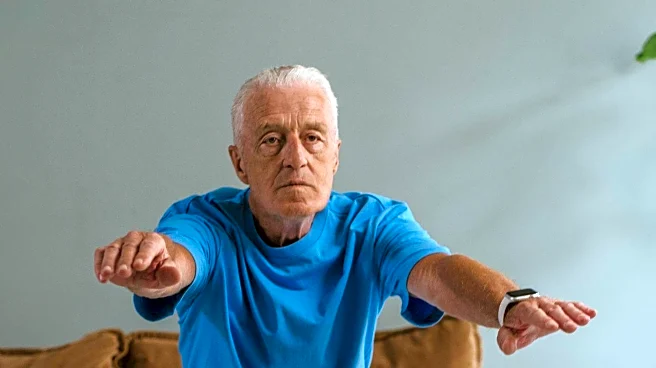What is the story about?
What's Happening?
A recent study has revealed that regular physical exercise can significantly strengthen the immune system, particularly in older adults with a history of endurance training. The research, conducted by an international team and published in Scientific Reports, focused on 'natural killer' (NK) cells, which are crucial for detecting and combating viruses and diseased cells. The study involved analyzing the immune cells of individuals aged 64 on average, divided into groups based on their training history. Findings indicated that those engaged in endurance exercises for over 20 years had NK cells that were more adaptable, less inflammatory, and metabolically efficient compared to their sedentary counterparts. This suggests that exercise not only benefits physical health but also enhances immune function, potentially leading to better control of inflammation and improved response to stressors.
Why It's Important?
The implications of this study are significant for public health, particularly in the context of aging populations. As the immune system can be influenced by various factors such as diet, sleep, and lifestyle, incorporating regular physical exercise could be a key strategy in promoting healthier aging. The research highlights how endurance training can modulate the immune response, offering a protective effect against chronic diseases linked to inflammation. This could lead to reduced healthcare costs and improved quality of life for older adults. Additionally, understanding the relationship between exercise and immune function may inform public health policies and encourage the integration of physical activity into daily routines to enhance overall health outcomes.
What's Next?
Further research is likely to explore the specific mechanisms by which exercise influences immune function and how these can be optimized for different age groups. There may be increased interest in developing exercise programs tailored to enhance immune health, particularly for older adults. Healthcare providers and policymakers might consider promoting physical activity as a preventive measure against age-related diseases. Additionally, studies could investigate the potential benefits of exercise on other aspects of health, such as mental well-being and cognitive function, providing a holistic approach to aging healthily.
Beyond the Headlines
The study also raises questions about the broader societal impact of promoting physical exercise as a means to improve immune health. There could be ethical considerations regarding access to exercise facilities and programs, especially for disadvantaged communities. Moreover, the cultural shift towards valuing physical activity as a component of healthcare could influence how society views aging and wellness. Long-term, this could lead to changes in healthcare systems, emphasizing preventive care and lifestyle interventions.















